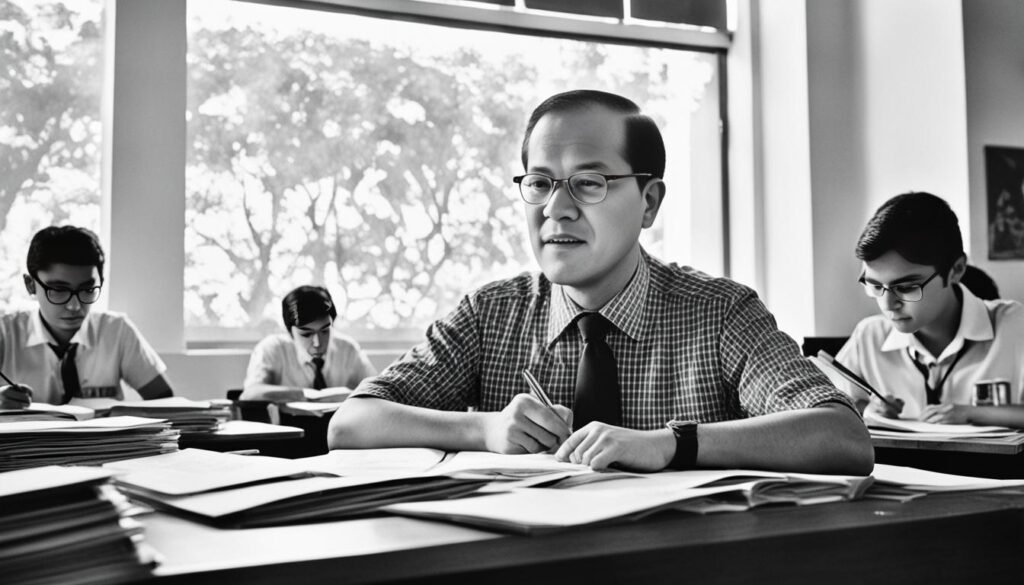Did you know that Benigno Aquino III, also known as Noynoy Aquino, served as the 15th President of the Philippines from 2010 to 2016? His presidency left a lasting impact on Philippine politics, and his legacy continues to shape the nation’s political landscape.
Key Takeaways:
- Benigno Aquino III was the 15th President of the Philippines.
- His presidency spanned from 2010 to 2016.
- Aquino came from a prominent political family and left a lasting legacy in Philippine politics.
- His advocacy for democracy and human rights was a central theme of his presidency.
- Aquino’s administration implemented key policies and initiatives, but also faced criticisms and controversies.
The Aquino Legacy: A Political Dynasty
The Aquino family has left an indelible mark on Philippine politics for several generations, shaping the country’s political landscape. Known for their dedication to public service and their influential contributions, the Aquino family has established a political dynasty that has greatly influenced the nation. At the center of this legacy is Benigno Aquino III, whose parents and grandparents played significant roles in the country’s governance.
The Aquino Ancestry and Its Political Involvement
The Aquino lineage is intertwined with Philippine politics. Benigno Aquino III’s mother, Corazon Aquino, served as the 11th President of the Philippines, leading the country through a critical transition period after the Marcos dictatorship. She became an icon of democracy and inspired millions with her leadership. Benigno’s father, Benigno Aquino Jr., was known as a prominent opposition leader and an influential senator, constantly challenging the government’s policies and advocating for the Filipino people.
This strong political involvement and dedication to public service have been a defining characteristic of the Aquino family. Their contributions have shaped the country’s political landscape and have played a crucial role in its development.
Benigno Aquino III’s Early Introduction to Politics
From an early age, Benigno Aquino III was exposed to the world of politics. Growing up in a family deeply rooted in public service, he witnessed firsthand the challenges and rewards of political involvement. This early introduction to politics provided him with a unique perspective and a deep understanding of the complexities of governance.
Aquino’s parents and grandparents instilled in him the values of integrity, dedication, and a commitment to serving the Filipino people. These values, combined with his exposure to political affairs from a young age, laid the foundation for his own political career.
Early Years and Education
Benigno Aquino III, the 15th President of the Philippines, was born on February 8, 1960, in Manila, Philippines. Growing up in a family of prominence, with both his parents heavily involved in politics, Aquino had a privileged childhood. He attended prestigious schools and was surrounded by influential figures in Philippine society. His early exposure to the world of politics and the challenges faced by the Filipino people shaped his aspirations and sense of responsibility.
Childhood in a Family of Prominence
Benigno Aquino III was born into the Aquino family, which had a profound impact on Philippine politics for several generations. His mother, Corazon Aquino, served as the 11th President of the Philippines, while his father, Benigno Aquino Jr., was a prominent senator and opposition leader. Growing up in a family that played a key role in the country’s political landscape, Aquino witnessed firsthand the realities of public service and the power of using one’s influence for positive change.
Aquino’s Academic Journey at Ateneo de Manila
Ateneo de Manila University played a significant role in Benigno Aquino III’s education and development. He pursued a Bachelor of Arts degree in economics at Ateneo, where he gained a strong foundation in critical thinking and social awareness. The rigorous academic environment and diverse student body at Ateneo nurtured Aquino’s passion for public service and instilled in him a deep sense of responsibility towards the Filipino people.

Benigno Aquino III: The Rise Through Philippine Politics
After completing his education, Benigno Aquino III embarked on a political career that spanned several decades. He first served as a member of the House of Representatives and later became a senator. Aquino’s rise through Philippine politics was influenced by his family’s political legacy and his own dedication to public service. His positions in both the House of Representatives and the Senate allowed him to gain valuable experience and establish himself as a respected political figure.
Throughout his career, Benigno Aquino III demonstrated a deep commitment to serving the Filipino people. He was shaped by his family’s political involvement and had the opportunity to learn from their experiences. This familial influence, combined with his own dedication, propelled him forward in his political journey.
Aquino’s early experience as a member of the House of Representatives provided him with valuable insights into the workings of Philippine governance. He actively participated in legislative processes, contributing to the formulation of policies that affected the lives of ordinary Filipinos. This firsthand experience in the legislative branch allowed him to develop a nuanced understanding of the intricacies of policymaking.
In his later years as a senator, Aquino continued to display his passion for public service. He championed various causes, advocating for the welfare of marginalized sectors and pushing for reforms that aimed to address societal inequalities. Aquino’s dedication to his constituents and his principled stance on important issues earned him the respect of his peers and the admiration of the Filipino public.
Benigno Aquino III’s rise through Philippine politics was marked by his unwavering commitment to public service and his determination to make a positive impact on the lives of his fellow Filipinos. His experiences in both the House of Representatives and the Senate equipped him with the necessary knowledge and skills to lead the country as its 15th President.
Ascension to the Presidency
Benigno Aquino III’s journey to the presidency began with a compelling and groundbreaking campaign in the 2010 election. Running on a platform that emphasized transparency, good governance, and accountability, Aquino struck a chord with the Filipino people, capturing their aspirations for a better future. His message resonated strongly, and he emerged victorious with a significant majority, symbolizing a wave of change in Philippine politics.
The 2010 Presidential Campaign
Aquino’s campaign reflected his commitment to address the issues that plagued the nation. He pledged to fight corruption, restore trust in government institutions, and champion the needs of the Filipino people. With his family’s political legacy and widespread support among the masses, Aquino’s candidacy gained momentum, positioning him as a formidable contender for the presidency.
His campaign rallies attracted large crowds, demonstrating the people’s hope for a leader who would deliver on their aspirations. Aquino’s visionary promises and genuine connection with the electorate played a pivotal role in securing his victory.
A New Leader: The Inauguration of Aquino
The inauguration of Benigno Aquino III marked a significant milestone in Philippine history. On June 30, 2010, he was sworn in as the 15th President of the Philippines, succeeding Gloria Macapagal Arroyo. The inauguration ceremony embodied optimism and renewed faith in the nation’s future.
As Aquino took his oath of office, the Filipino people looked to him as a beacon of hope and a symbol of change. His eloquent address outlined his vision for the country and his commitment to bring about positive transformation. The inauguration represented a fresh start and the beginning of a new era in Philippine politics, with the anticipation of transformative leadership under Aquino’s presidency.

Inauguration Table:
| Date | Event | Location |
|---|---|---|
| June 30, 2010 | Inauguration Ceremony | Quirino Grandstand, Manila |
| June 30, 2010 | Oath-taking Ceremony | Malacañang Palace, Manila |
| June 30, 2010 | Inaugural Address | Quirino Grandstand, Manila |
Benigno Aquino III’s Administration: Key Policies and Initiatives
During Benigno Aquino III’s administration, several key policies and initiatives were implemented to improve the lives of Filipinos. The administration focused on both domestic policy achievements and economic growth, although it faced challenges along the way.
Domestic Policy Achievements
One of the significant achievements of Aquino’s administration was the implementation of healthcare reforms. The government invested in improving healthcare infrastructure, increasing access to quality healthcare services, and enhancing healthcare programs for marginalized communities.
In the field of education, Aquino’s administration prioritized reforms and improvements. Initiatives such as the K to 12 Basic Education Program aimed to enhance the country’s education system and provide students with a globally competitive education.
Social welfare programs were also a key focus of the administration. Aquino’s government introduced programs to alleviate poverty and promote social equality, such as the Conditional Cash Transfer Program and the Pantawid Pamilyang Pilipino Program.
Economic Growth and Challenges
Another vital aspect of Aquino’s administration was the emphasis on economic growth. His government implemented policies to attract investments, stimulate economic activity, and create job opportunities. Through these initiatives, the Philippines experienced significant economic growth and emerged as one of the fastest-growing economies in Asia.
However, the administration also faced challenges, such as high unemployment rates and widespread poverty. Despite the overall economic growth, these issues persisted, highlighting the need for further efforts to create inclusive growth and improve the livelihoods of all Filipinos.
Foreign Affairs Under President Aquino III
During Benigno Aquino III’s presidency, the Philippines witnessed significant developments in its foreign affairs, particularly in relation to international relations and the South China Sea dispute. Aquino adopted an assertive stance in defending Philippine sovereignty and protecting national interests in the face of China’s growing influence in the region.
In his efforts to address the South China Sea dispute, Aquino actively pursued international support for the Philippines’ claims. He sought diplomatic and legal recourse, initiating arbitration proceedings against China in the Permanent Court of Arbitration.
“We are committed to upholding Philippine sovereignty and protecting our rightful territorial claims in the South China Sea. We believe in the rule of law and the peaceful resolution of disputes,”
This approach aimed to safeguard Philippine interests and maintain stability in the region. Aquino’s efforts in foreign affairs garnered both praise and criticism from various stakeholders, highlighting the complex dynamics involved in navigating international relations.
The South China Sea dispute has been a longstanding issue in the region, with multiple countries claiming sovereignty over various islands and waters. Aquino’s assertive stance in defending Philippine territorial claims contributed to shaping the discourse and actions surrounding this complex conflict.
As the Philippines continues to engage in international relations, the legacy of Benigno Aquino III’s foreign affairs approach remains an integral part of the country’s diplomatic endeavors. His commitment to upholding Philippine sovereignty and protecting national interests has had a lasting impact on the country’s foreign policy.
Legacy and Criticisms: A Balanced Evaluation
Benigno Aquino III’s presidency left behind a mixed legacy that warrants a balanced evaluation. His administration achieved significant economic growth and implemented crucial infrastructural developments, improving the overall state of the country’s infrastructure. The economic impact of Aquino’s policies cannot be understated, as he laid the foundation for a more prosperous Philippines.
Aquino’s government made substantial investments in key sectors such as transportation, energy, and communications, resulting in improved connectivity and efficiency. The construction of new roads, bridges, airports, and ports bolstered the nation’s infrastructure, promoting economic development and facilitating trade.
However, Aquino’s presidency faced various criticisms, particularly regarding the handling of certain policies and the pushback-induced controversies. Critics emphasized the inadequacies in addressing pressing social issues such as poverty, unemployment, and income inequality. Additionally, some questioned the effectiveness and sustainability of his economic reforms, arguing that the benefits were not equally distributed among the population.
Controversial policies during Aquino’s tenure also drew criticism from different sectors. For example, his administration’s response to natural disasters—such as Typhoon Haiyan in 2013—was met with mixed reactions, with some questioning the government’s preparedness and response efforts.
To fully evaluate Aquino’s legacy, it is essential to consider both the positive and negative aspects of his administration. While his economic impact and infrastructural developments were undoubtedly significant, the criticisms and controversies shed light on the complexities of governance and the need for continuous improvement in addressing societal issues.

Aquino’s Advocacy for Democracy and Human Rights
Throughout his presidency, Benigno Aquino III strongly advocated for democracy and human rights in the Philippines. He aimed to strengthen democratic institutions, uphold the rule of law, and promote accountability in government. Aquino prioritized the protection of human rights, particularly in addressing issues such as extrajudicial killings and enforced disappearances. His commitment to democracy and human rights reflected his belief in the importance of a just and inclusive society.
“We must protect the rights and freedoms of every Filipino. It is our duty to ensure that justice prevails and that no one is above the law.” –Benigno Aquino III
Aquino recognized the significance of a robust democratic system and worked tirelessly to safeguard its foundations. He championed the principles of transparency, accountability, and citizen participation, aiming to empower the Filipino people and strengthen their trust in the government.
Under Aquino’s leadership, efforts were made to address systemic issues that infringed upon human rights. The administration implemented reforms to combat corruption, enhance judicial independence, and protect vulnerable sectors of society. Aquino’s commitment to human rights extended to advocating for gender equality, indigenous rights, and the rights of marginalized communities.
Aquino’s unwavering support for democratic values and human rights earned him recognition both locally and internationally. His administration actively engaged with human rights organizations and promoted dialogue on pressing issues, contributing to the advancement of human rights discourse in the Philippines.
In conclusion, Benigno Aquino III’s advocacy for democracy and human rights left an indelible mark on the Philippine political landscape. His commitment to these fundamental principles shaped his governance approach and inspired the Filipino people to take an active role in shaping their future. Aquino’s legacy as a champion of democracy and human rights will continue to resonate in the hearts and minds of the nation.
The Judicial Trials Post-Presidency
After leaving office, Benigno Aquino III faced judicial trials related to his actions during his presidency. He was involved in legal proceedings regarding the 2015 Mamasapano clash and the approval of a controversial budget project. Aquino’s legal battles attracted significant public attention and scrutiny, with the outcome of these trials impacting his post-presidential legacy. Aquino was ultimately acquitted of the charges filed against him in relation to the Mamasapano incident.

Personal Life and Public Persona
When examining the life of Benigno Aquino III, it is essential to look beyond his presidency and delve into his personal life and public persona. His upbringing and family played a crucial role in shaping his identity as a leader, and his personal values greatly influenced his approach to governance. The close bond with his parents and the influence of his sister, Kris Aquino, left a lasting impact on his political beliefs.
From an early age, Aquino was instilled with values such as integrity, honesty, and dedication to public service, which guided his actions and decisions throughout his political career. His family’s commitment to public service and their prominent role in Philippine politics undoubtedly influenced his own aspirations and desire to make a difference in the lives of his fellow countrymen.
Moreover, Aquino’s public persona played a significant role in shaping his relationship with the Filipino people. Known by the nicknames “Noynoy” and “PNoy,” he projected an image of relatability and approachability that endeared him to many. His down-to-earth personality and humble demeanor allowed him to connect with the masses on a deeper level, fostering a sense of trust and understanding.
In conclusion, Benigno Aquino III’s personal life and public persona were integral to his identity as a leader. The influence of his family, coupled with his personal values and relatable nature, contributed to his effectiveness as a president and his lasting impact on the Filipino people.
Health Issues and Hospitalization
During and after his presidency, Benigno Aquino III faced various health issues that affected his well-being. He was diagnosed with medical conditions such as diabetes and hypertension, which required ongoing management and treatment. Aquino’s health struggles became a matter of public concern, highlighting the importance of physical well-being for leaders.
As a result of his health challenges, Aquino underwent hospitalization and received medical care to address his conditions. These treatments and hospital stays added to the complexities of his post-presidential life, impacting his ability to engage in public activities and fulfill his role as a prominent figure in the Philippines.

Tributes and the Nation’s Mourning
The passing of Benigno Aquino III in 2021 sparked a period of national mourning in the Philippines. The Filipino people paid tribute to their former president through public displays of grief, memorial services, and commemorations. Aquino’s contributions to the country were acknowledged, and his legacy was honored by both supporters and critics. The nation’s mourning reflected the impact and significance of Aquino’s presidency on the collective memory of the Filipino people.
Benigno Aquino III’s Enduring Influence in Philippine Culture
Beyond his political career, Benigno Aquino III has left an indelible mark on Philippine culture. His presidency and the values he championed have become ingrained in the national consciousness, shaping the collective identity of Filipinos. Aquino’s enduring influence extends across various realms, including politics, governance, and public service. His notable contributions continue to resonate, inspiring future leaders and fostering conversations on important issues such as democracy, human rights, and social justice.
Conclusion
In conclusion, the presidency of Benigno Aquino III left a lasting impact on the Philippines. Through his administration, he implemented key policies and initiatives that significantly influenced the country’s domestic and foreign affairs. Aquino’s unwavering advocacy for democracy and human rights demonstrated his commitment to creating a just and inclusive society.
Assessing Aquino’s contributions requires a comprehensive evaluation of both the positive and negative aspects of his tenure. While his administration achieved notable economic growth and implemented infrastructural developments, it also faced criticisms and challenges. Controversial policies sparked pushback from various sectors, highlighting the complexities of governing a diverse nation.
Looking ahead, the future of Aquino’s political vision rests in the hands of the next generation of leaders. It is their responsibility to build upon the foundation he laid and further advance the ideals of democracy, human rights, and social justice. The legacy of Benigno Aquino III will continue to inspire and shape the political landscape of the Philippines for years to come.
FAQ
Who was Benigno Aquino III?
Benigno Aquino III, also known as Noynoy Aquino, was the 15th President of the Philippines from 2010 to 2016.
Did Benigno Aquino III come from a political family?
Yes, Benigno Aquino III came from a renowned political dynasty in the Philippines. His parents and grandparents were heavily involved in public service.
What is Benigno Aquino III’s educational background?
Benigno Aquino III pursued a Bachelor of Arts degree in economics at Ateneo de Manila University.
What positions did Benigno Aquino III hold before becoming president?
Before assuming the presidency, Benigno Aquino III served as a senator and member of the House of Representatives in the Philippines.
What were some key policies implemented during Benigno Aquino III’s administration?
Benigno Aquino III’s administration implemented healthcare reforms, improvements in education, and social welfare programs.
How did Benigno Aquino III handle issues in Philippine foreign affairs?
Benigno Aquino III adopted a more assertive stance in the country’s international relations, particularly in the South China Sea dispute.
What was the legacy of Benigno Aquino III’s presidency?
Benigno Aquino III’s presidency had a mixed legacy, with achievements in economic growth and infrastructural developments, as well as criticisms regarding certain policies and issues.
What were Benigno Aquino III’s advocacies?
Benigno Aquino III strongly advocated for democracy and human rights in the Philippines, aiming to strengthen democratic institutions and uphold the rule of law.
Did Benigno Aquino III face any legal trials after his presidency?
Yes, Benigno Aquino III faced legal proceedings related to actions during his presidency, such as the 2015 Mamasapano clash and the approval of a controversial budget project.
What was Benigno Aquino III’s public image?
Benigno Aquino III was widely known as “Noynoy” or “PNoy,” reflecting his relatability and down-to-earth personality.
Did Benigno Aquino III face health issues?
Yes, Benigno Aquino III faced health challenges, including diabetes and hypertension, which impacted his post-presidential life.
How was Benigno Aquino III remembered after his passing?
Benigno Aquino III’s passing sparked a period of national mourning in the Philippines, with tributes and commemorations honoring his contributions to the country.
What was Benigno Aquino III’s enduring influence on Philippine culture?
Benigno Aquino III’s presidency and the values he espoused have become part of the national narrative and continue to shape the collective consciousness of Filipinos.
What is the assessment of Benigno Aquino III’s contributions?
Assessing Benigno Aquino III’s contributions requires considering both the positive and negative aspects of his tenure as the President of the Philippines.
What is the future of Benigno Aquino III’s political vision?
The future of Benigno Aquino III’s political vision lies in the hands of the next generation of leaders who will build upon the foundation he laid.
Source Links
- https://www.britannica.com/biography/Benigno-Aquino-III
- https://en.wikipedia.org/wiki/Ninoy_Aquino
- https://en.wikipedia.org/wiki/Benigno_Aquino_III

